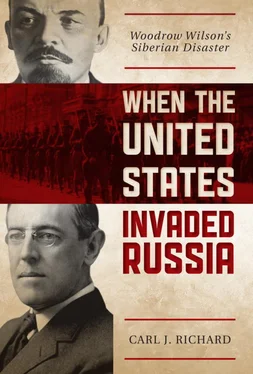Far from mollified by the Czech withdrawal from the town and their renewed pledge not to oppose Soviet authority, on May 21 an angry deputy of Trotsky ordered that all Czech units along the Trans-Siberian Railway be detrained and that the Czechs be organized into labor groups or drafted into the Red Army. On the previous day, the Bolsheviks also arrested leading members of the Russian branch of the Czech National Council in Moscow. These leaders then ordered Czech officers to surrender the corps’ weapons to the Bolsheviks. The Czech officers ignored the disarmament orders, reasoning that their jailed leaders had been pressured into issuing them. On May 25, Trotsky ordered, “Every armed Czechoslovak found on the railway is to be shot on the spot.” Furthermore, any Soviet official failing to enforce the disarmament order would be charged with treason. As a result of this order, fighting between the Bolsheviks and the Czechs erupted all along the western portion of the Trans-Siberian Railway. By early June, the Czechs had captured much of western Siberia and were protecting anti-Bolshevik governments springing up there. By overreacting to the brief occupation of Chelyabinsk, Trotsky had provoked the very Czech uprising he feared. [53] Ackerman, Trailing the Bolsheviki , 129; Peter Fleming, The Fate of Admiral Kolchak (London: Rupert Hart-Davis, 1963), 18–23; Bunyan, Intervention, Civil War, and Communism in Russia , 86–88, 91.
The startling news of the Czechs’ sudden control of western Siberia, achieved in a matter of weeks, swept like a shock wave through the United States. By the end of May 1918, the Czechs had gone from complete obscurity to being idealized heroes in the imagination of the American public. The reports of their victories were crucial to Wilson’s decision to intervene in Siberia. [54] Thomas G. Masaryk, The Making of a State: Memories and Observations, 1914–1918 , trans. and introduced by Henry Wickham Steed (New York: Frederick A. Stokes, 1927), 276.
Wilson’s previous fear that Allied intervention would alienate the Russian people, who would view it as an imperialist enterprise, was now overridden simultaneously by two considerations. The first was the alarming military success of the Central Powers in the late spring and early summer of 1918. Even Great Britain and the United States were now unsafe from German attacks. Great Britain was struck continually by German air raids. In early June two German submarines terrorized the U.S. Atlantic coast. Due to these attacks, the port of New York was closed completely, while the U.S. Senate debated the question of whether American coasts and shipping were properly protected from the German menace. Incredibly, the streets of Fifth Avenue and Broadway were dimmed in order to hinder German air raids. It remains a mystery from what base it was expected that the Germans would launch their biplanes. Perhaps the far-sighted officials of Manhattan anticipated the development of the aircraft carrier. [55] Jefferson Caffery Papers, University of Louisiana at Lafayette, May 20, 1918, Times of London clipping; Ray Stannard Baker, ed., Woodrow Wilson: Life and Letters (New York: Doubleday, 1939), vol. 8, 187–88, 191, 193.
The news on the Western Front was even bleaker. The chief development there was the great success of General Erich Ludendorff’s spring offensive. On May 27, after the French ignored the warnings of an American intelligence officer that the Germans would attack them at the Chemin des Dames Ridge, the Germans broke through and advanced twelve miles, a penetration so sudden and deep that it amazed even Ludendorff. Three days later, the German Army was again on the Marne River, the outskirts of Paris. Barrages from long-range German artillery, combined with air raids, pounded the city. From March to July 1918 the German Army inflicted over one million casualties on the Allies. [56] Coffman, War to End All Wars , 158, 213.
Meanwhile, the commander of the American Expeditionary Force in Europe, John J. Pershing, was painfully slow in committing American troops to battle. Pershing was firmly opposed to sending U.S. soldiers into combat before they had been organized into American divisions and had Wilson’s full backing for this position. Understandably, Pershing did not like the idea of Americans fighting under foreign commanders, and British and French generals had not exactly covered themselves with glory in the war. But the process of organizing American divisions was time consuming. Furthermore, Pershing made matters worse by insisting that valuable shipping space be reserved for cavalry units, whose value on the Western Front had long been called into question. As Supreme Commander Foch told Pershing in frustration, “The American Army may arrive to find the British pushed into the sea and the French driven back behind the Loire, while it tries in vain to organize on lost battlefields over the graves of Allied soldiers.” [57] Ibid., 10, 49, 171; B. H. Liddell Hart, The War in Outline, 1914–1918 (New York: Random House, 1936), 245–49.
In fact, despite Pershing’s unwillingness to let his troops fight under foreign command, he agreed with Foch’s bleak assessment of the situation on the Western Front. On June 17, he wrote to Secretary of War Baker, “If further serious reverses come to us this year it is going to be very difficult to hold France in the war.” Morale among the Allies was so low that Pershing worried that their despair would rub off on his own men. Pershing urged that as many American soldiers as possible be sent to France in the next few months. Stricken with fear at the prospect of the fall of Paris, the Allies made the transportation of American troops to France the greatest naval priority of 1918. U.S. Army Chief of Staff Peyton March promised, “We’ll pack them in like sardines,” even keeping his promise at the expense of vital supplies, and the British so escalated their transportation of American doughboys (allegedly so called by the Allies because the large buttons on their uniforms made them look like gingerbread men) that they soon surpassed the American navy in this endeavor. [58] Baker, Woodrow Wilson , John J. Pershing to Newton D. Baker, June 17, 1918, vol. 8, 217; Coffman, War to End All Wars , 177, 180, 182; John Ellis, Eye-Deep in Hell: Trench Warfare in World War I (New York: Pantheon, 1976), 178.
The rapid transportation of large numbers of American soldiers to France was also the request of the prime ministers of Great Britain, France, and Italy. On June 2, they drafted a joint message to Wilson, in which they stated:
General Foch has presented to us a statement of the utmost gravity, which points out that the numerical superiority of the enemy in France, where 162 Allied divisions are now opposed by 200 German divisions, is very heavy, and that there is no possibility of the British and French increasing the number of their divisions (on the contrary, they are put to extreme straits to keep them up); there is a great danger of the war being lost unless the numerical inferiority of the Allies can be remedied as rapidly as possible by the advent of American troops.
The prime ministers urged that large numbers of American soldiers and machine gunners be sent to France immediately and estimated that another 100 American divisions would be needed to achieve victory over the Central Powers. Meanwhile, officials of the French government were packing their papers, preparing to evacuate Paris for Bordeaux, while Clemenceau toyed with the idea of giving up the city without a fight. By July 6, the day Wilson decided to intervene in Siberia, the situation had not improved. On that day the assistant secretary to the U.S. ambassador to France, Jefferson Caffery, wrote to his family in Lafayette, Louisiana, that the two plagues of Paris, inflation and German air raids, were doing more damage than ever. [59] Baker, Woodrow Wilson , Tasker H. Bliss to Newton D. Baker, June 1, 1918, vol. 8, 182; Georges Clemenceau, David Lloyd George, and Vittorio Orlando to Wilson, June 2, 1918, vol. 8, 185–86; Wilson Papers, Newton D. Baker to Wilson, June 21, 1918; Jefferson Caffery Papers, Jefferson Caffery to family, July 6, 1918; Coffman, War to End All Wars , 213.
Читать дальше












